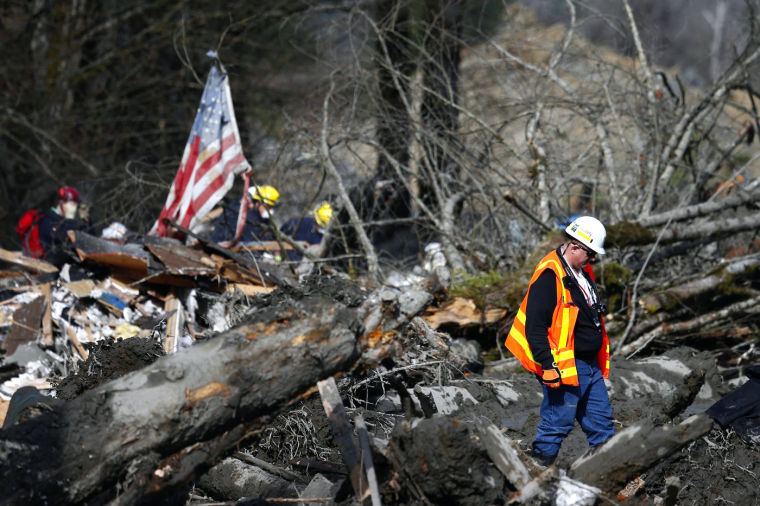Searchers can’t be choosers
Washington State Department of Transportation safety manager Mike Breysse examines the areas devastated by the mudslide near Oso, Wash., March 24.
April 11, 2014
The recent mudslide in Oso, Wash., has become the official ode to tragedy of 2014 as the death toll reaches 36 with another 10 people still missing.
Surprisingly, few have spoken about how many volunteers hoping to help with the searches in Oso have been turned away, especially during the first couple of weeks when the probability of finding people alive was highest.
The Oso mudslide buried dozens of houses on March 22, and since then Washington residents have buried dozens more of their closest family members, according to The Huffington Post.
Recovery efforts for those still missing have been charged with the same intensity in the days immediately after the slide, but have been hampered by the trademark western Washington rain, which has created treacherous conditions. The square-mile of mud and debris that is now Oso is still considered very dangerous.
Originally, the estimated number of missing people was around 180, but the number quickly fell to 90 within a week after the slide, according to Reuters. Now only 11 people remain missing.
In a situation in which so many were in danger, the search effort only included about 200 people, according to the Reuters article. Local volunteers were turned away during a very critical and short window in which finding survivors, and not bodies, was a possibility.
The combination of perilous conditions and intense emotions made police turn away many who could have helped in the search effort. While it’s understandable, there could have been a much better use of those who were ready and willing to help.
Professional or trained volunteers were allowed to be a part of the initial search effort, and police could have easily paired professional and local volunteers to make the best use of manpower.
Unfortunately, they didn’t, and it is very unlikely that the 11 people still missing will be found alive, if at all.
The current search is aided by more than 20 FEMA dog teams, which will be critical in finding victims in areas where the sludge is dozens of feet deep, according to Q13 Fox. These teams are certainly valued and needed, but more of them were needed earlier on.
Among the missing are a 4-year-old and 14 year-old boy, both of whom have very low probabilities of surviving for five weeks in such a hazardous environment.
Turning away any unprofessional volunteer seriously jeopardized the chance that any of the missing victims would be found alive. A number of volunteers in Washington have dedicated their lives to helping in the mudslide recovery, according to The Globe and Mail.
These volunteers search around the clock, renting chainsaws and other gear that is used until replacements can be found. Despite being turned away by authorities, many volunteers refused to leave and are now using their own credit cards to rent the heavy equipment necessary for rescue work.
Professional search teams are trained to be cautious. Many local volunteers used their knowledge of the area to cut into buried homes while the professional teams moved rather slowly, according to the article from The Globe and Mail.
Many of the locals heard cries for help in the first few hours after the mudslide, and yet authorities held them back from attempting such early rescues.
Caution can be a virtue in some instances, but not when the initiative is to save lives.
– Corrine Harris is a senior animal science major from Edmonds. She can be contacted at 335-2290 or by [email protected]. The opinions expressed in this column are not necessarily those of the staff of The Daily Evergreen or those of Student Publications.





















